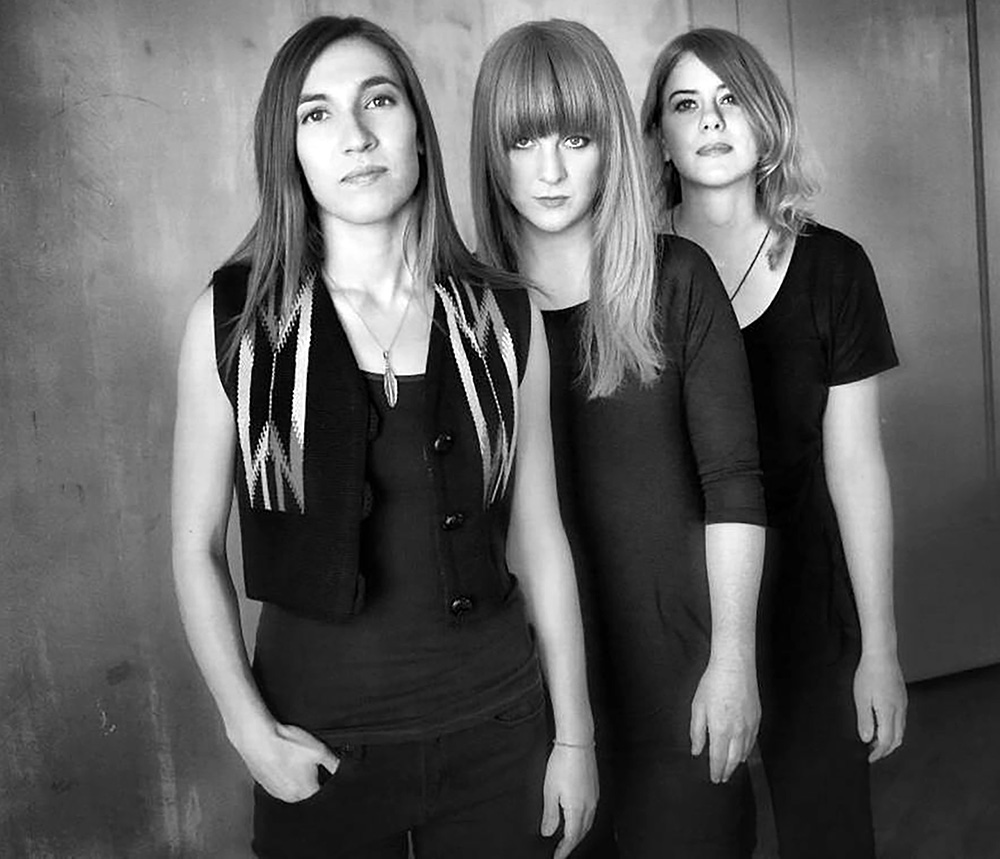
For more than six years, Katy Guillen & The Girls were one of the more successful bands to come out of Kansas City.
Their first big moment came in early 2014, when they made it to the finals of the International Blues Challenge in Memphis. After that, the trio—Katy Guillen, Claire Adams and Stephanie Williams—drew the attention of festivals and booking agents all over North America, which eventually led to a tour of Europe.
In September, the band announced that it would go on an “indefinite hiatus” beginning Jan. 1. A few farewell shows have been scheduled, including a final farewell show at Knuckleheads Saloon on Dec. 22.
Guillen recently answered questions about the band, its rise to national prominence and what may lie ahead.
I first saw you back when you were a duo with drummer Go-Go Ray, playing Saturday matinee gigs at the Brick. What do you remember about those days? How did they prepare you for what lay ahead?
Katy Guillen: Those days definitely set a foundation for what Katy Guillen & The Girls started on; at our very first show at Knuckleheads we played the entire Katy & Go-Go album. When I look back on those days, I was pushed outside my comfort zone, in terms of leading a project, performing, writing, developing a sound with others.
Working with Go-Go was a great experience that I’ll never forget. I learned so much during that time and was able to carry it with me to start Katy Guillen & The Girls, after we parted ways.
In 2014, Katy Guillen and the Girls won the Kansas City Blues Challenge, then went on to finish in the finals of the International Blue Challenge in Memphis. How formative were those experiences? How much did they propel your band upward in the blues world?
KG: The experience definitely shaped our next couple of years. We gained many opportunities from it, everything from playing the International Montreal Jazz Festival, to touring Sweden, to playing blues and jazz festivals across the country.
As much as it was a springboard for us to move up in the blues world, we were able to use those opportunities to build in other worlds as well. The benefits from it were all-encompassing for us. Preparing for the challenge made the band pull together and work hard on crafting the perfect set and executing it exactly how we felt best represented who we were. After that experience we had more of an identity and suddenly a reputation that we didn’t have before. It will always be a very important part of the band’s history.
You’ve been playing live since you were 14, attending blues jams at Harling’s. What comes to mind when you recall those days?
KG: I remember meeting so many different musicians and getting to play with a variety of people. It was one of the best learning experiences. I also remember feeling so many nerves every time I’d go to a jam, but then would feel so good after playing.
My dad and I would go to jam after jam every week and get invited to other jams, and sometimes to sit in with people. It was like dominoes; one jam would lead to another and another. We’d go to all of them. It was addicting. I learned so much and had a blast doing it.
Most musicians say their songs or albums are like their offspring so it’s hard to pick favorites. Your band released three albums and you released one with Go-Go. If you could, say something about each of them and what it means to you now, looking back.
KG: I will preface this section by saying I love all of these albums. They do feel like your babies after everything you put in to them.
Katy & Go-Go, When I Get Away: This was a significant album for me because it was the first album of all originals that was self-produced. The process for that album was pretty free and experimental. Most of the recording process was me and Duane Trower, who engineered it, just trying out a bunch of guitar ideas and layers. It was lots of fun. I’m proud of the album, although there are a few things I’d do differently now. But it was my first real crack at a record.
Katy Guillen & The Girls: This was the band’s first release. We worked together on the arrangements of the songs and self-produced it with Duane Trower engineering. It’s funny to me because we got branded a “blues” band by a lot of people, although none of our records have been “blues.” This album was blues-influenced, but it dipped into a couple of different sounds and styles, which was what we did as a band. It set up our sound and our energy.
Heavy Days: Our second release. We took it in more of a rock direction and branched out who we worked with. Paul Malinowski produced it, Duane Trower engineered and co-produced it again, and Black Lab Mastering mastered it. We put one of my favorite blues songs on this album, Baby Please Don’t Go by Big Joe Williams. I love the way we’ve adapted this song over the years. It’s always been one of our favorites to play live. I’m so happy we put it on this record.
Remember What You Knew Before: Our third album. It was so much fun to record. We recorded a few days at my house, then recorded a few days at Element, with Lennon Bone engineering and producing.
We tried all kinds of different things, from recording on the porch, to recording claps and stomps in an empty room upstairs. We adapted previously recorded originals into more acoustic and roots-y interpretations. We had a lot of requests for an acoustic record after doing a handful of acoustic shows. The sound on this album put us into a different realm, which is what we were shooting for. We wanted to go in more of an Americana direction.
You can play several styles of guitar, including flamenco. Will you continue to play primarily rock and blues or will you explore other styles?
KG: I love learning and playing different styles and genres whenever possible. I’ll definitely explore other styles and sounds.
Your last record, Remember What You Knew Before, was a collection of covers of your own songs, recast in a kind of Americana/country vein and it sounded very natural from you. Is that a possibility?
KG: Yes, it’s possible. I loved recording the more acoustic-geared stuff. It casts the songs in a very different light. As the songwriter, I appreciate hearing those different interpretations. Moving forward, I’d like to try a couple of different things out, sound-wise. Writing is fun and figuring out how you want songs to sound is fun. The possibilities are open right now.
Finally, what has living in Kansas City and being a vital part of its music scene meant to you and your band?
KG: It has been one of the greatest experiences for all of us thus far. We’re all proud to call Kansas City home and to get to tell people where we’re from when we tour. The music scene here is world-class. We have felt nothing but love from the Kansas City community. It has just been an honor.
Email Timothy Finn at tfinn@inkansascity.com


